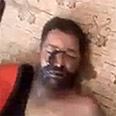
Rebels: Assad forces 'massacre' 85 in Damascus suburb
Assad's army launches devastating attack on makeshift hospital near Damascus, leaving 85 dead, including women, children
There was no immediate confirmation of the activists' account of what they described as a "massacre", including of women and children, at Jdeidet al-Fadel. Syrian authorities have banned most independent media since the uprising began two years ago.
Related stories:
- Secular Syrian rebels: Jihadists hijacking revolt
- Heavy clashes in Syria near Lebanese border
- Syria's Assad warns Jordan as southern border seethes
Jamal al-Golani, a member of the Revolution Leadership Council opposition group, said the number of dead may be higher than 250, mostly shot at close range, but the presence of army patrols made documenting all of them difficult.
The killings happened over several days as and after pro-Assad forces stormed an area where there were up to 270 rebels, Golani said, adding that he had counted 98 bodies in the streets and 86 people who he said had been summarily executed in makeshift clinics where they were lying wounded.
Abu Ahmad al-Rabi', an activist in the adjacent district of Jdeidet Artouz, said: "We documented 85 summarily executed, including 28 shot in a makeshift hospital after Assad's forces entered Jdeidet al-Fadel. We fear that the victims of the massacre are much higher."
The Syrian opposition called on Hezbollah to withdraw its fighters from the country immediately, as activists said regime troops supported by pro-government gunmen linked to the Lebanese Shiite militant group battled rebels Sunday for control of a string of villages near the Lebanon-Syria border.
The Syrian National Coalition – the main Western-backed opposition group – warned that Hezbollah involvement in Syria's civil war could lead to greater risks in the area, and urged the Lebanese government to "adopt the necessary measures to stop the aggression of Hezbollah" and to control the border to "prevent further risks and to protect civilians in the area."
Syrian state television said the army was trying to "uproot all the terrorists from the area." The government, which denies it is facing a popular uprising, describes the revolt as a foreign-backed plot and calls those trying to topple it "terrorists."
Lebanon's state-run news agency reported two shells fired from Syria landed Sunday in the town of Hermel near the frontier with Syria, causing material damage but no casualties. A day earlier, two mortar rounds landed in the town for the first time, marking an escalation in violence along the already tense border.
Iranian support
In Damascus, a senior Iranian lawmaker on Sunday expressed support for Assad, and said that what he called the US-led battle to oust the Syrian leader had failed.
Alaeddin Boroujerdi, the head of Iran's parliamentary committee on national interest and foreign policy, said Tehran is "happy that the US, with its abilities and regional allies, has failed despite its efforts" to topple Assad.
"Today, they are the losers in the game, no doubt," Boroujerdi told Iranian state TV ahead of talks with Syrian Foreign Minister Walid al-Moallem. Iran is Syria's chief regional ally.
Al-Moallem repeated the government line that Syria is the victim of a foreign conspiracy hatched by the United States in cooperation with Syria's neighbors. Damascus has previously rebuked Saudi Arabia and Qatar for financing arms purchases to the rebels, and Turkey and Jordan for allowing arms shipments.
The US has long called for Assad to leave power, but for months did not play an active role in backing the rebellion. Recently, however, Washington has grown more assertive, helping cobble together the Syrian National Coalition late last year in the hopes that it could unite the deeply divided opposition and provide a conduit for aid to the rebels.
At an international conference on Saturday in Istanbul that brought together the opposition leadership and its chief international supporters, US Secretary of State John Kerry announced that the Obama administration would double its non-lethal assistance to the Syrian opposition with an additional $123 million in supplies.
That could include for the first time armored vehicles, body armor, night vision goggles and other defensive military supplies, officials said.
The additional aid brings total non-lethal US assistance to the opposition to $250 million since the fighting began more than two years ago. Washington has refused so far to provide weapons to Syria's rebels out of fears they could fall in the hands of extremists.
The US pledge was the only tangible, public offer of new international support at the meeting of the foreign ministers of the 11 main countries supporting the opposition and fell well short of what the opposition has been appealing for: weapons and direct military intervention to stop the violence that has killed more than 70,000 people.
The Syrian National Coalition is seeking drone strikes on sites from which the regime has fired missiles, the imposition of no-fly zones and protected humanitarian corridors to ensure the safety of civilians.
- Receive Ynetnews updates directly to your desktop










